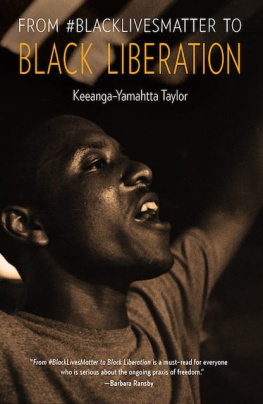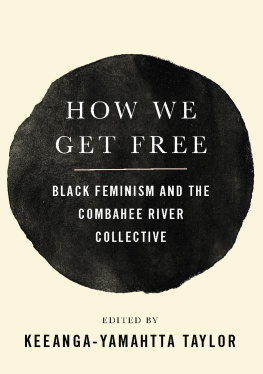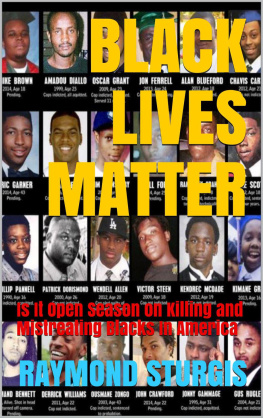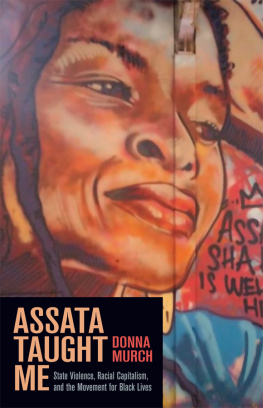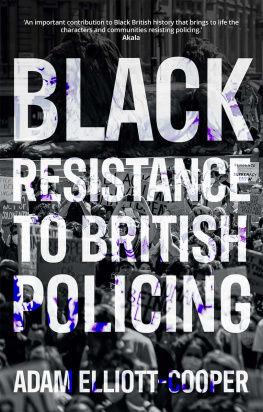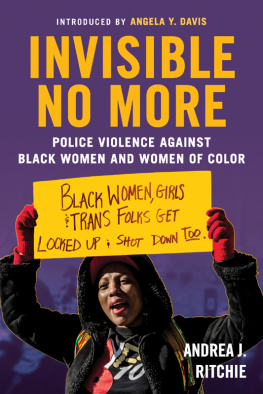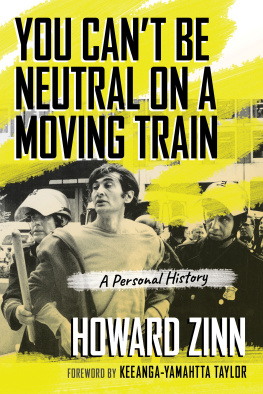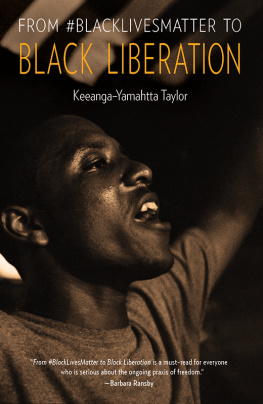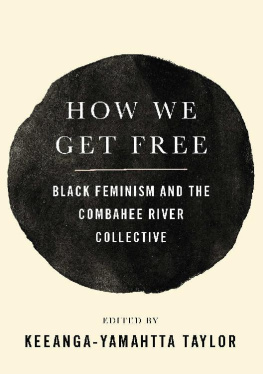Table of Contents
PRAISE FOR
FROM #BLACKLIVESMATTER TO BLACK LIBERATION
Keeanga-Yamahtta Taylors searching examination of the social, political, and economic dimensions of the prevailing racial order offers important context for understanding the necessity of the emerging movement for black liberation.
Michelle Alexander, author of The New Jim Crow
Class matters! In this clear-eyed, historically informed account of the latest wave of resistance to state violence, Keeanga-Yamahtta Taylor not only exposes the canard of colorblindness but reveals how structural racism and class oppression are joined at the hip. If todays rebels ever expect to end inequality and racialized state violence, she warns, then capitalism must also end. And that requires forging new solidarities, envisioning a new social and economic order, and pushing a struggle to protect Black lives to its logical conclusion: a revolution capable of transforming the entire nation.
Robin D. G. Kelley, author of Freedom Dreams: The Black Radical Imagination
With political eloquence, intellectual rigor, and an unapologetically left analysis, the brilliant scholar-activist Keeanga-Yamahtta Taylor has provided a powerful contribution to our collective understanding of the current stage of the Black freedom struggle in the United States, how we arrived at this point, and what battles we need to fight in order to truly achieve liberation. From #BlackLivesMatter to Black Liberation is a must read for everyone who is serious about the ongoing praxis of freedom.
Barbara Ransby, author of Ella Baker and the Black Freedom Movement: A Radical Democratic Vision
Keeanga-Yamahtta Taylor has a strong voice, a sharp mind, and a clear, readable style that all come together in this penetrating, vital analysis of race and class at this critical moment in Americas racial history.
Gary Younge, editor at large, Guardian
Keeanga-Yamahtta Taylor brings the long history of Black radical theorizing and scholarship into the neoliberal twenty-first century with From #BlackLivesMatter to Black Liberation . Her strong voice is deeply needed at a time when young activists are once again reforging a Black liberation movement that is under constant attack. Deeply rooted in Black radical, feminist, and socialist traditions, Taylors book is an outstanding example of the type of analysis that is needed to build movements for freedom and self-determination in a far more complicated terrain than that confronted by the activists of the twentieth century. Her book is required reading for anyone interested in justice, equality, and freedom.
Michael C. Dawson, author of Blacks in and out of the Left
From #BlackLivesMatter to Black Liberation is a profoundly insightful book from one of the brightest new lights in African American Studies. Keeanga-Yamahtta Taylor invites us to rethink the postwar history of the United States and to place the actions of everyday people, including the hundreds of thousands of African Americans who participated in the urban rebellions and wildcat strikes of 1960s and 1970s, at the forefront of American politics. By doing so, she offers up a usable past for interpreting the current anti-state-sanctioned-violence movement sweeping the United States in the early twenty-first century. This timely volume provides much needed analysis not only of race and criminalization in modern American history but of the specific roles played by a bipartisan electoral elite, the corporate sector, and the new black political class in producing our current onslaught of police killings and mass incarceration in the years since the Voting Rights Acts passage. Taylors fluent voice as historian and political theorist renders legible the accomplishments and, perhaps most importantly, the expansive possibilities of a new generation of black youth activism.
Donna Murch, author of Living for the City: Migration, Education, and the Rise of the Black Panther Party in Oakland, California
Keeanga-Yamahtta Taylor has given us an important book, one that might help us to understand the roots of the contemporary policing crisis and build popular opposition capable of transforming the current, dismal state of affairs. Equal parts historical analysis and forceful polemic, From #BlackLivesMatter to Black Liberation provides a much-needed antidote to the postracial patter that has defined the Obama years, but it also serves as a proper corrective for the new civil rights movement posturing of some activists. Against such nostalgic thinking, Taylor reminds us of the new historical conditions we face and the unique challenges created by decades of African American political integration. From #BlackLivesMatter to Black Liberation sketches a politics that rightly connects antipolice brutality protests and a broader anti-capitalist project. Everyone who has grown sick of too many undeserved deaths at the hands of police and vigilantes should read and debate this book.
Cedric G. Johnson, author of Revolutionaries to Race Leaders: Black Power and the Making of African American Politics

2016 Keeanga-Yamahtta Taylor
Published by
Haymarket Books
P.O. Box 180165
Chicago, IL 60618
773-583-7884
www.haymarketbooks.org
ISBN: 978-1-60846-563-7
Trade distribution:
In the US through Consortium Book Sales and Distribution, www.cbsd.com
In the UK, Turnaround Publisher Services, www.turnaround-uk.com
In Canada, Publishers Group Canada, www.pgcbooks.ca
All other countries, Publishers Group Worldwide, www.pgw.com
This book was published with the generous support of the Wallace Action Fund and Lannan Foundation.
Cover image 2014 Evan Simko-Bednarski.
Cover and text design by Eric Kerl.
Library of Congress CIP Data is available.
Contents
To the parents, brothers, sisters, partners, and friends of those who have been killed by police and other forms of state-sanctioned violence and yet remain committed to the struggle for a just world Find out just what any people will quietly submit to and you have found out the exact measure of injustice and wrong which will be imposed upon them, and these will continue till they are resisted with either words or blows, or with both. The limits of tyrants are prescribed by the endurance of those whom they oppress.
Frederick Douglass , 1857
INTRODUCTION
Black Awakening in Obamas America
I am not sad that black Americans are rebelling; this was not only inevitable but eminently desirable. Without this magnificent ferment among Negroes, the old evasions and procrastinations would have continued indefinitely. Black men have slammed the door shut on a past of deadening passivity. Except for the Reconstruction years, they have never in their long history on American soil struggled with such creativity and courage for their freedom. These are our bright years of emergence; though they are painful ones, they cannot be avoided.... In these trying circumstances, the black revolution is much more than a struggle for the rights of Negroes. It is forcing America to face all its interrelated flawsracism, poverty, militarism, and materialism. It is exposing the evils that are rooted deeply in the whole structure of our society. It reveals systemic rather than superficial flaws and suggests that radical reconstruction of society itself is the real issue to be faced.... Todays dissenters tell the complacent majority that the time has come when further evasion of social responsibility in a turbulent world will court disaster and death. America has not yet changed because so many think it need not change, but this is the illusion of the damned. America must change because twenty-three million black citizens will no longer live supinely in a wretched past. They have left the valley of despair; they have found strength in struggle. Joined by white allies, they will shake the prison walls until they fall. America must change. Martin Luther King Jr. , A Testament of Hope, 1969
Next page
